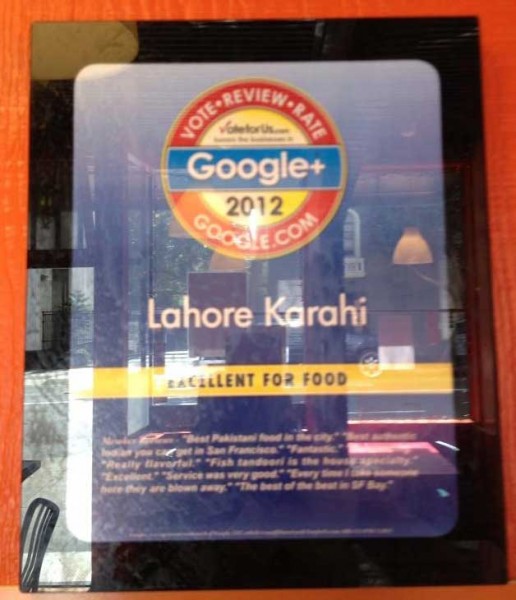Understanding Google My Business & Local Search
Google Plaque for Excellence: NOT
 This afternoon Rocky Agrawal tweeted out about this plaque he had noticed hanging in a restaurant. He (and I ) were completely fooled by the plaque and were convinced that it was really from Google. I even thought that perhaps it was an experiment on Google’s part to migrate away from Zagat signage.
This afternoon Rocky Agrawal tweeted out about this plaque he had noticed hanging in a restaurant. He (and I ) were completely fooled by the plaque and were convinced that it was really from Google. I even thought that perhaps it was an experiment on Google’s part to migrate away from Zagat signage.
—–
| Rakesh Agrawal (@rakeshlobster) |
|
Strange use of Google+ brand in local. pic.twitter.com/yXoN5ZGx
|
—–
It didn’t take Rocky but a few minutes to figure out that the SMB had paid $300 for this plaque. And you (or your customers) can buy one too from InTheSpotLight.com.
—–
| Rakesh Agrawal (@rakeshlobster) |
|
Looks like that plaque I posted was really a $300 ripoff of small businesses. inthespotlight.com/plaques.yahoo.… This is C+D worthy.
|
—–
I am not sure who I think less of in this situation, the restaurant that was trying to appear more than they really are by leveraging Google’s name and their review product or the company that soaked them $300 for the “privilege”. A restaurant or hotel can order a sign that touts their good standing with just about any review company including Yelp, TripAdvisor, Zagat, Frommers and many more.
When businesses that are looking for a quick fix deal with companies that are willing to accommodate them, the customer inevitably loses. And in this case so does Google, Yelp, all the other companies whose name can be put on the plaque and every one else in the local space.
© Copyright 2026 - MIKE BLUMENTHAL, ALL RIGHT RESERVED.



Comments
10 Comments
Unbelievable. Well, actually I can see how an outfit like this survives…nobody who buys a plaque ever speaks up…
On the bright side, I imagine some people will do a quick fact-check on their phones and do an about-face to the place down the street once they realize that they’re in a restaurant that probably isn’t above using pink slime in the food.
@phil
Some might. But the default mental position on the signs is acceptance. It happened to Rocky, it happened to me. When I showed it to others in a “blind” test they thought it looked like an award.
These brands have a lot of cred. I suspect all too many folks would take them at face value.
I’m not going to jump on the business owner or the guy selling the plaques as quickly as you guys did. Yes, the plaques take advantage of these big brand names, and there may even be some legal issues using their trademarks – who knows.
However, how is this any different than a business owner highlighting his best reviews from Google, Yahoo, etc. on his own website? This is just an offline version of it.
Yes, the plaques look like an award at first glance but if customers aren’t going to pay attention and actually read it, that’s their problem (in my opinion). And ultimately a plaque/award doesn’t mean anything anyway if the food and service sucks. A customer isn’t going to change their opinion just because there is a plaque on the wall. I personally don’t pick and choose restaurants based on the awards they get and I suspect I’m no different than most people so what’s the big deal if this guy has a plaque that looks like an award on his wall?
If this guy’s food and service is good and he’s a legit business, why shouldn’t he be able to put something like this on his wall? And yes, $300 is a joke, but if he has the money and he thinks it’s worth it, what’s the issue? And if the plaque guy can get business owners to pay it…what’s the problem with that?
Travis Van Slooten
@travis
The issue for me in making judgement is intent. If there is an intent to deceive then it breaches trust and is minimally unethical if not illegal (although in this case it might be).
If a business puts reviews on their website and says: look at us we are good, that is an honest communication with any reader being able to see the source and context and not be deceived.
If on the other hand, a customer enters an establishment and was led to believe that this business was Google rated or Zagat rated that is both a different context and a different intention. I would consider the act unethical.
As for the company charging $300 for a plaque that is also intended to deceive …. And is likely breaking some law or another as well.
Travis —> “…but if customers aren’t going to pay attention and actually read it, that’s their problem (in my opinion)”
A customer (or potential customer) shouldn’t have to read the fine print to assess the authenticity of something like this. It’s an ethical issue (in my opinion), and any business who blatantly misrepresents themselves in this way, is unethical.
@Travis
“…how is this any different than a business owner highlighting his best reviews from Google, Yahoo, etc. on his own website?”
The trouble is the plaque is inherently misleading. You’ve got the circular fake badge at the top. Then there’s the “Excellent for Food” strip. Worst of all, the little “great food” blurbs at the bottom have no attribution, so that makes it appear as though they’re associated with the “award” – i.e. straight from Google.
It would take a local-search junkie to say “Oh, the ‘excellent’ part must be referring to the fact that this restaurant has a ‘23/30’ average rating, which Google considers “Very good to excellent’.” Even if you say that nothing on the plaque is not *somehow* reflected in the restaurant’s Google reviews, things like the “Excellent” part are a gross distortion at best. To the average customer who wonders “Gee, why doesn’t that other restaurant down the street have an ‘Excellent for Food’ rating,” it’s absolutely misleading.
The businesses with these plaques may have great reviews, but the plaques aren’t highlighting those reviews. They’re twisting the reviews beyond recognition.
Hi Guys,
This post really got me thinking about how this concept of a plaque is actually a meritorious idea, if done right. I decide to riff on the subject:
http://www.solaswebdesign.net/wordpress/?p=1302
Sometimes, seeing something done badly makes you consider how to do it better.
@Mike
I can definitely see why businesses would want these in their windows; many would take them at face value. Even though we are entrenched and knowledgeable doesn’t mean the rest of the public is.
@Travis
“…how is this any different than a business owner highlighting his best reviews from Google, Yahoo, etc. on his own website?”
Because it’s not from Google. It’s a fake. I’d have to agree with Andy, consumers should not have to read the fine print or decipher between a real award and a phoney.
And yes, Mike. It is about intent. The intent here is to trick the consumer into beleiving the restaurant earned a great reputation from Google. Simple as that. I don’t know how they can sell plaques like these and not have any legal raminfications.
That’s pretty funny. It’s amazing what some places do to try and attract attention.
Comments for this post are closed.